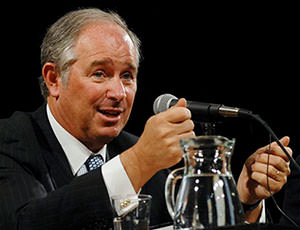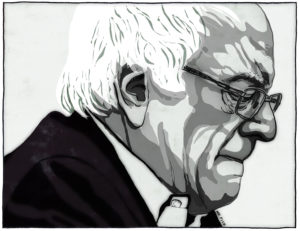Whiny Billionaires in Need of Sequestration
Where is the Occupy movement now that the depravity of the super rich is on full display?
Where is the Occupy movement now that the depravity of the super rich is on full display?
The suddenly increased national debt is primarily the result of a deep recession caused by the top bankers and hedge fund hustlers of Wall Street, saved from their folly by massive and costly federal intervention. The result has been a season of obscene profit for them, while the rest of the nation has floundered. But instead of making the rich pay, ordinary citizens will be visited with job furloughs and a savaging of public services that often are lifesaving.
Consider two stories this week that make Karl Marx look prescient: one, in The Wall Street Journal, concerns the payout of $1 billion in bonuses to nine private equity executives; the other, under a New York Times headline, states that the jobless recovery has been a boondoggle for corporate profits. “Recovery in U.S. Is Lifting Profits, but Not Adding Jobs,” the headline reads, by way of explaining why the stock market is nearing its unprecedented high while the unemployment picture remains so dismally bleak.
But whenever a politician dares to hold those “fat cats” accountable, as Barack Obama once did, he or she is branded by apologists for the super rich as a socialist engaging in class warfare. The outrage of the entitled as opposed to the despair of the dispossessed is the cultural norm, as evidenced by Stephen Schwarzman, one of the more egregious of those private equity billionaires.
What is truly outrageous about Schwarzman is not the $213.3 million he got last year from Blackstone, the private equity company where he has long been the CEO. Heck, he “earned” that much the previous year and has been raking it in since he co-founded the company back in 1985. What is startling, and it goes to the hubris of America’s most wealthy at the heart of the current sequester impasse, is that he thinks the more than $1 billion he and eight other private equity executives got in compensation last year should continue to be taxed at the “carried interest” rate of 15 percent, rather than the 35 percent reserved for ordinary income.
When President Obama first threatened to end that weird tax break for the top strata of the super rich back in 2010, it sent Schwarzman into a tizzy, complaining “It’s a war. … It’s like when Hitler invaded Poland in 1939.” At the time, Schwarzman had accumulated a fortune of $4.7 billion — now a cool $2 billion more, according to Forbes — hardly the fate of those occupied by Hitler.
His is a company that invested heavily in the distressed housing market, exploiting the pain of those losing their homes to foreclosure, as he crowed in a conference call with investors, reported on the Blackstone website, about “still seeing attractive opportunities in many places in the world including … distressed and over-leveraged real estate. … ” Wallowing in that sad world of the foreclosed, Schwarzman bragged “we’re the largest in the world.”
Last year Blackstone spent about $1.5 billion purchasing 10,000 foreclosed homes. “This is the kind of thing that happens once, every once in a while, where you see something that’s a market-turning trend and we are loading the boat,” Schwarzman said in an earnings call Oct. 18. Those foreclosed homes are typical of the “alternative assets” in which Blackstone has specialized.
For private equity companies like Blackstone, the economic crisis and the federal government’s response to it have ushered in unprecedented boom times that dwarfed the ill gotten gains of their counterparts in the much more regulated commercial banking world. “In contrast,” The Wall Street Journal reported, “private-equity firms have rebounded strongly in the last couple of years, helped by low interest rates and more appetite for risk among big investors who pour money into deals with the firms.”
But the other fat cats in the corporate world are doing quite well in comparison to the fate of regular Americans. Although corporate earnings have jumped at an annual rate of 20.1 percent since 2008, The New York Times reported, the disposable income of America’s wage earners increased yearly by a scant 1.4 percent after allowing for inflation. Corporations’ profits as a share of national income are now at their highest point in more than 60 years, while the income of their employees is at a 45-year low.
While the country now debates the causes and cures for the enormous public debt runup since the onset of the Great Recession, it is quite clear that a national bipartisan policy of bailing out Wall Street has succeeded splendidly, but at the expense of the average citizen.
It is brutally immoral that the proposed cuts in federal spending now be imposed on the victims of the meltdown rather than the perpetrators of their financial ruin. Occupy Wall Street is gone, but the headline in Monday’s WSJ states “New York City Leads Jump in Homeless.”
Your support matters…Independent journalism is under threat and overshadowed by heavily funded mainstream media.
You can help level the playing field. Become a member.
Your tax-deductible contribution keeps us digging beneath the headlines to give you thought-provoking, investigative reporting and analysis that unearths what's really happening- without compromise.
Give today to support our courageous, independent journalists.






You need to be a supporter to comment.
There are currently no responses to this article.
Be the first to respond.